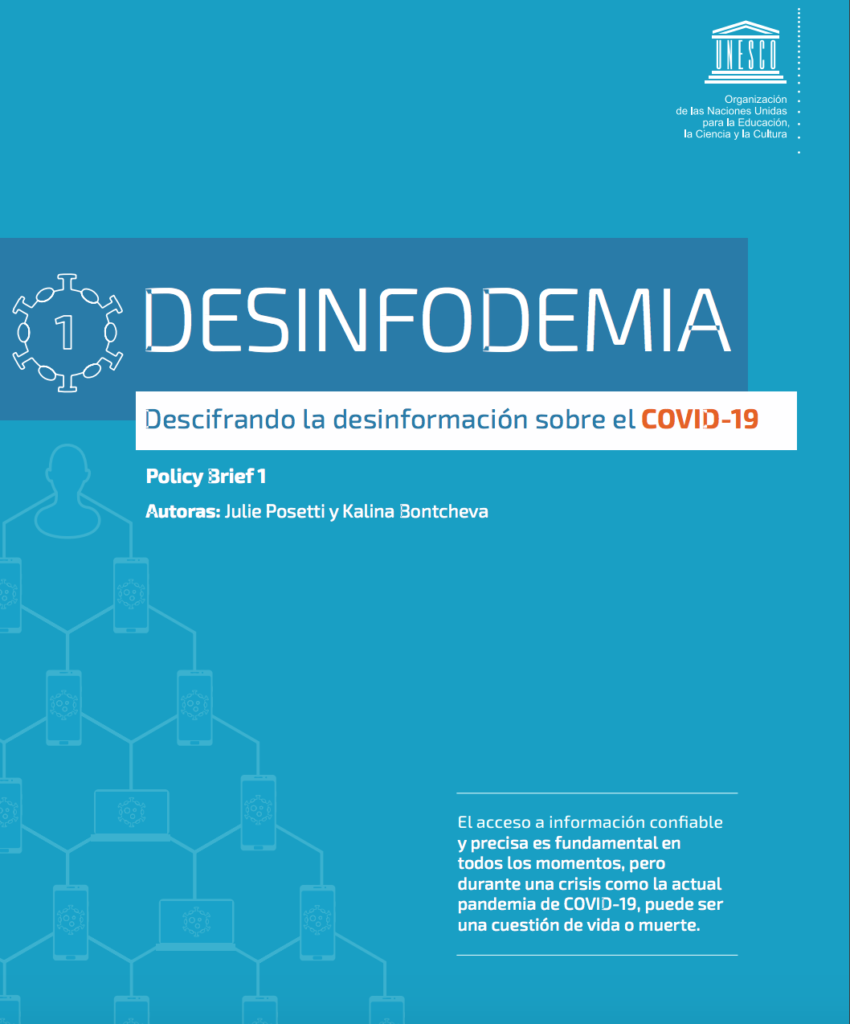“Disinformation” is a word that UNESCO uses to describe a problem that the citizens of the world are facing in a parallel manner to the crisis caused by the COVID-19 pandemic: false information about the new virus that has circulated at a speed impossible to control.
The disinformation surrounding the coronavirus is of such magnitude that, according to the organization’s experts, this is a type of pandemic that can have effects that are “more mortal than the disinformation about other issues, such as politics and democracy.” The false information on this issue generate confusion and it is difficult for citizens to make decisions that can save lives, the organization added.
“The phenomenon of disinformation has turned into one of the most complex pieces of the vast puzzle that form the risks associated with the ecosystem of social media. To understand its various edges is a fundamental step in finding the much needed solutions to counter them,” Guilherme Canela, Chief of Section for Freedom of Expression and Safety of Journalists at UNESCO, told LatAm Journalism Review.

Portada del primer informe de política de la Unesco sobre la desinformación alrededor de COVID-19. (Captura de pantalla).
For this reason, UNESCO published two policy brief reports that deal with this problem in analyzing the types of viral disinformation that help impulse the pandemic and investigate what the response to the problem is from media all the way to the State going through media companies via the internet. They also analyze these responses, assess the risks of possibly very restrictive measures - especially their impact on fundamental rights such as freedom of expression - and offer recommendations so that the responses align with international human rights standards.
“In this process [of understanding the problem], journalists play a fundamental role in helping their readers, including decision makers in various spheres, to understand the phenomenon by shedding light on the issue. These two policy papers are maps that help to take this path," explained Canela.
Through these reports, UNESCO invites journalists, news publishers, internet communications companies, service providers and regulators, civil society organizations as well as member states to help "flatten the curve" of disinformation surrounding COVID-19.
To achieve this, they have established four designed objectives that can: effectively contain and counteract the dangerous falsehoods caused by disinformation; helping States to bring their responses to curb the ‘infodemic’ in line with international standards on freedom of expression, access to public information and privacy; offer citizens information literacy skills in such a way that they are empowered; and supporting independent journalism so that it can offer verifiable and reliable information.
Even though the versions in English were published last April 24, the versions in spanish were released this July.
“Desinfodemia: Descifrando la desinformación sobre el COVID-19” is the first of the two reports that starts from the principal that if information empowers people, disinformation takes away this power. “Access to verifiable and trustworthy information makes the right of freedom of expression significant. The infodemic works diametrically against this right during a pandemic,” said UNESCO.
The authors Julie Posetti and Kalina Bontcheva analyzed the nine types of disinformation about the coronavirus, the four ways in which they take place and identify ten categories of responses put into action that most of the time have implications for freedom of expression.
For the second report, “Desinfodemia: Diseccionando respuestas a la desinformación sobre el COVID-19,” the same authors critically analyzed those ten responses to the spread of disinformation. In analyzing them, the authors take into account the life cycle of false information such as production, transmission, reception, and reproduction; and how each of these processes can be tackled. Special attention in this analysis has the impact that these responses may have on human rights to freedom of expression, access to public information and privacy.
The reports were made by UNESCO’s Communication and Information sector to continue its mandate to "promote freedom of expression and universal access to information". The documents were endorsed by the International Center for Journalists (ICFJ), an organization that has been helping journalists around the world - who have been at the forefront of the fight against disinformation - so they can deliver accurate, reliable and verifiable information to the world's citizens, said UNESCO.